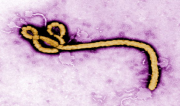Article
Tracing Ebola Victims Proves Challenging for Foreign Responders
Author(s):
As the Ebola outbreak in West Africa continues to intensify and widen, the collection of obstacles in the way of the people trying to help those so desperately in need also seems to constantly be growing.

As the Ebola outbreak in West Africa continues to intensify and widen, the collection of obstacles in the way of the people trying to help those so desperately in need also seems to constantly be growing.
For example, a recent CNN report on “disease detective” Lt. Rebecca Levine of the US Public Health Service documented how conditions on the ground in Sierra Leone are making it difficult to implement tactics such as contact tracing that have been proven in the past to help contain disease outbreaks.
The process of contact tracing involves finding people who were infected with the virus and tracing back their steps for the past three weeks to find all the other infected people they have come in contact with. However, finding people in resource-poor communities in West Africa is not as easy as a web search or looking in the white pages. Even locating usable addresses for contacts can be a challenge.
Levine told CNN that the database of addresses kept by the Ministry of Health in Sierra Leone was “pretty much in shambles;” barely 30% of the contacts in the database had accurate addresses.
Add to that the fact that many local health officials had never heard of contact tracing and Levine’s job got that much harder.
The United Nations estimates that in all of West Africa only 16 of the 44 potential zones for contact tracing have maps that can be accurately checked.
“There’s a lot of infection out there,” noted Bruce Aylward, assistant director-general of the World Health Organization. “Contact tracing breaks down. Then you have a real problem.”
The CNN report noted that even when tracers are able to find the people they are looking for, they may not always be the most cooperative people to work with. “The community perceives this as a death sentence,” said Donald Thea, an infectious disease epidemiologist at the Boston University School of Public Health.
Thea said that local mistrust or suspicion of people coming in from other parts of the world has resulted in some tracers being deliberately blocked in their work by the people they are trying to help.
Complicating matters even further is the fact that the people directly affected by the virus know there is very little that can be done to help them even when they are found.
“With smallpox, we could offer people a vaccine, a carrot in essence to induce them to be cooperative. With Ebola, we have nothing,” Thea said.


